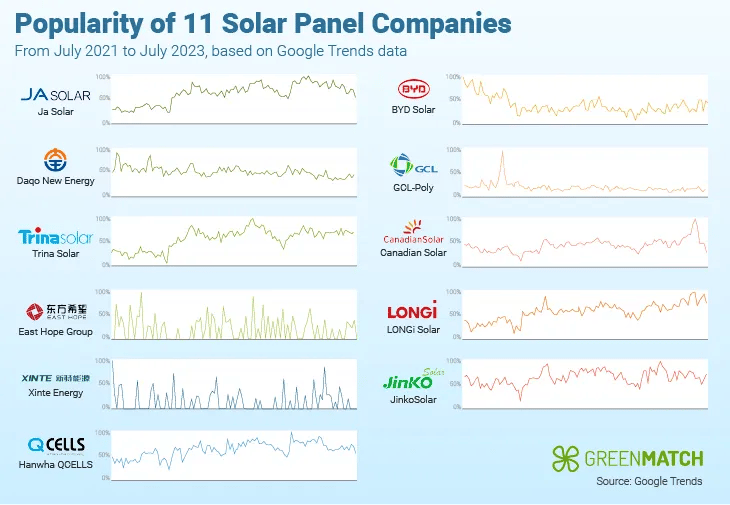- GreenMatch
- Blog
- Solar Companies Linked to Forced Labour
Solar companies linked to forced labour continue to grow steadily in popularity despite government actions

The use of forced labour in the solar panel industry, particularly among the Uyghur population in China, has been a growing concern. Reports have linked several solar companies with factories in Xinjiang to forced labour practices, particularly for workers from the Uighur minority.
Despite political support for action to sanction China and curb imports of products with forced labour in their supply chains, the solar industry faces a problem, too much dependence on Xinjiang and a lack of supply chain transparency. This article examines the link between solar panel production and slave labour practices in Xinjiang, what countries are doing about it and the impact on accused solar brands.
Xinjiang's forced labour practices and the solar industry's dependence
Recently, concerns have been raised about the forced labour practices in Xinjiang, China, and their connection to the solar energy industry. Reports have emerged linking solar companies with factories in Xinjiang to programs accused of forced labour practices. This raises important questions about the ethical implications of the solar industry's dependence on labour from this region.
The solar industry, which prides itself on clean and responsible growth, has faced scrutiny for its involvement with companies that utilise forced labour. Major solar companies have been tied, raising concerns about the human rights violations associated with producing solar panels.
There is a pressing need to transition to clean energy sources to combat climate change. Nearly every silicon-based solar module will likely have Xinjiang silicon. Efforts are being made to address these concerns and promote ethical practices within the solar industry. Calls for government subsidies for green technology, exceptions to intellectual property disputes, and the use of trade agreements to raise global pollution standards have been made.
Key brands linked to slave labour practices
According to reports from various sources, several major solar companies have been implicated in the use of forced labour in their solar supply chains. The companies named in these reports include GCL-Poly, East Hope Group, Daqo New Energy, Xinte Energy, Jinko Solar, JA Solar, LONGi Solar, Trina Solar, BYD, Hanwha Q Cells, and Canadian Solar.
Together, the solar companies named in the reports supply more than a third of the world's polysilicon, refined from rock and ultimately turned into the photovoltaic panels that end up on rooftops and energy projects, including those in the United States and Europe. This has led to calls for greater transparency and accountability within the industry.
The allegations of forced labour in the supply chains of these solar companies have led to significant consequences. The U.S. government has taken action to block more than 1,000 shipments of solar energy components from China's Xinjiang region over concerns about slave labour. Despite these concerns and efforts, the solar industry continues to grow, and the popularity of these key brands remains strong.
Recent Google search trends highlight consumers' concern about key brands linked to slave labour practices. Despite the negative publicity, some of these brands continue to grow in the solar panel market, as consumers prioritise price and efficiency over ethical considerations. However, the tide may be turning as more consumers demand transparency and accountability from the companies they support.

Some brands have addressed the issue by implementing fair labour practices and partnering with organisations to improve working conditions. One essential brand linked to solar panel slave labour that is working to rectify its stand in the industry is Jinko Solar. However, the company has stated that it strongly condemns the use of forced labour and does not engage in it in its hiring practices. They have also signed a call to action by the Solar Energy Industries Association (SEIA) to ensure the solar supply chain is free of forced labour.
UK Government response
The United Kingdom has taken a strong stance against forced labour in on-grid, photovoltaic solar energy production. This comes after the University of Nottingham's Rights Lab developed a new method for estimating the risk of forced labour in this industry.
The UK's Modern Slavery Act requires companies with over £36 million turnover to report their efforts to prevent modern slavery in their supply chains. This includes companies producing solar panels linked to forced labour in countries like China.
The UK government has also pledged to work with international partners to address this issue. This includes supporting the International Labour Organization's efforts to eliminate forced labour and promoting ethical sourcing through the Ethical Trading Initiative. This Initiative was implemented after it was reported that up to 40% of UK solar farms were built using panels from leading Chinese companies linked to forced labour in Xinjiang.
The UK's stance against forced labour in the solar panel industry is a step in the right direction. This came as an announcement to help ensure that no UK organisations are complicit in the violations perpetrated against the Uyghurs and other minorities in Xinjiang. By purchasing solar panels from companies that prioritise ethical sourcing and labour practices, we can help create a demand for responsible production.
Global countries' stance
As the world is moving towards using renewable energy, the world's biggest solar producers, including companies from the UK, Germany, the US, Australia, Japan, and Kenya, have been found to employ forced Uyghur labour in their supply chains. In addressing the issue at hand, the US and other countries are taking steps to address Chinese forced labour. These actions aim to reduce reliance on solar panels produced using forced labour and promote sustainable solar manufacturing practices.
The U.S. government has taken steps to crack down on forced labour in the supply chain for solar panels in Xinjiang, including a ban on imports from a silicon producer there. In contrast,e Canada has banned the import of solar panels from specific Chinese companies due to concerns over human rights violations.
The Australian government, a Clean Energy Council member representing renewable energy companies and solar installers, has called for more local renewable energy production and manufacturing. The council also proposes a "certificate of origin" scheme to counter concerns about slave labour.
The UK's approach to supply chain transparency has inspired similar acts in other countries, such as Germany, France, and The Netherlands, which have all passed acts mandating supply chain due diligence. Germany, a member of the EU, is taking steps to address forced labour in producing solar panels in China. German solar companies are calling on the German government to support the domestic solar industry and help resurrect it.
The European Union has also introduced regulations to ensure that companies importing solar panels into the EU are not using forced labour. The regulations require companies to conduct due diligence to ensure that solar panels are produced ethically and sustainably. Consumers should be aware of the labour practices of the companies they support and demand that they take steps to ensure that forced labour is not used in their supply chains.
The Way Forward: Ethical and Sustainable Solar Supply Chains
The solar industry is particularly vulnerable to forced labour in the Uyghur region because 95% of solar modules rely on one primary component, polysilicon, produced in Xinjiang. The solar industry has committed to promoting a better, more socially responsible future for solar PV technology. However, there is still a need for industry actors and governments to take action to address the issue.
The Solar Energy Industries Association (SEIA) has developed the Solar Supply Chain Traceability Protocol. Solar module producers will be able to adopt this protocol, which includes a series of steps they can take to trace the sources of their supply chain.
In addition to addressing the issue, the solar industry must raise awareness and acknowledge its role in promoting a better, more socially responsible future for solar PV technology. The world needs more diverse solar panel supply chains to ensure a secure transition to net zero emissions. Rebuilding domestic solar supply chains will hinge on incentives, not tariffs.
As efforts are being made to address these concerns, companies should work with their suppliers and trade groups to implement tracing and auditing programs to verify that their supply chains are free from potential labour abuses. The solar industry is being pushed to examine its supply chain and take action to prevent forced labour practices.
However, it is crucial to address the issue of forced labour in the solar panel supply chain. The allegations of slave labour practices raise ethical concerns and highlight the need for transparency and responsible sourcing in the industry. The solar industry must examine its supply chain and take steps to ensure that forced labour is not present at any stage of production.

Inemesit is a seasoned content writer with 9 years of experience in B2B and B2C. Her expertise in sustainability and green technologies guides readers towards eco-friendly choices, significantly contributing to the field of renewable energy and environmental sustainability.
We strive to connect our customers with the right product and supplier. Would you like to be part of GreenMatch?

Stay up to date with energy saving tips and grant alerts
Receive offers, marketing and promotions via email from Leads.io about GreenMatch and our brands/partners to help you save.
Thank you for subscribing to our newsletter!
Your email has been successfully added to our list. We look forward to sharing our latest updates with you soon!
